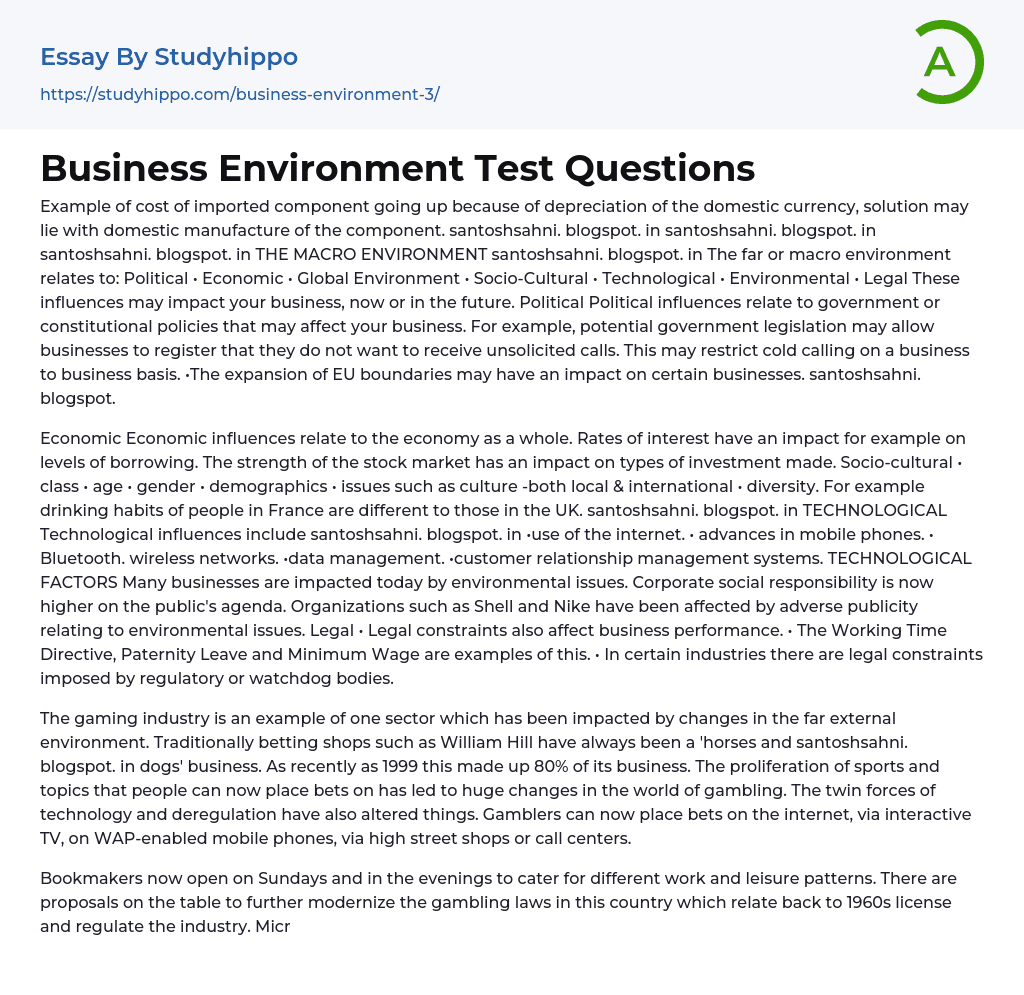The example demonstrates that when a domestic currency depreciates, the cost of imported components can increase. In this situation, one possible solution is to produce the component domestically. santoshsahni.blogspot.in THE MACRO ENVIRONMENT santoshsahni.blogspot.in The macro environment includes various factors: Political, Economic, Global Environment, Socio-Cultural, Technological, Environmental, Legal. These influences have the potential to currently or in the future impact your business. Political influences refer to government policies that may affect your business. For instance, legislation allowing businesses to opt out of receiving unsolicited calls can limit cold calling between businesses. The expansion of EU boundaries can also have an impact on certain businesses. santoshsahni.blogspot.in
Economic influences involve factors like interest rates and the stock market that impact borrowing levels and investment choices. Socio-cultural factors include social class, age, gender,
...demographics, and cultural differences between local and international contexts. For instance, drinking habits differ between France and the UK. Technological influences encompass internet usage, advancements in mobile phones, Bluetooth and wireless networks, data management systems, and customer relationship management systems. Environmental issues have also become crucial for businesses today with a greater focus on corporate social responsibility. Companies such as Shell and Nike have faced negative publicity due to environmental concerns. Legal constraints also affect business performance through regulations such as the Working Time Directive, Paternity Leave policies, and Minimum Wage regulations imposed by regulatory or watchdog bodies on specific industries.
The gaming industry has been greatly affected by changes in the external environment, specifically William Hill, a betting shop that primarily focused on horse and dog racing. In 1999, these activities made up 80% of their business. However, the gambling worl
has experienced significant transformations due to the introduction of a wider range of sports and subjects to bet on. Furthermore, advancements in technology and relaxed regulations have also played a role in reshaping the industry. Gamblers now have multiple options for placing bets including through the internet, interactive TV, WAP-enabled mobile phones, high street shops, and call centers.
To accommodate various work and leisure schedules, bookmakers have extended their operating hours to include Sundays and evenings. Currently, there are proposals to update the gambling laws in this country that were originally established in the 1960s. The Microsoft Antitrust Case involved the government perceiving Microsoft as a paranoid monopolist always ready to attack any competition. According to Harry Edwards, Chief Judge of the US District Court for Appeals for the District of Columbia, Microsoft was seen as someone who would shoot at any movement, even during nighttime. In Seattle, where Microsoft is located, it was commonly said that "The Sun was definitely shining."
Microsoft and its stakeholders are pleased with the recent ruling from the US Court of Appeals for the District of Columbia. CEO Steven Ballmer has expressed satisfaction with overturning the previous order to divide the company into two entities by the District Court. Despite facing anti-trust investigations in the late 1990s, Microsoft remained determined to continue progressing as it entered a new era in the millennium.
Microsoft faced criticism for providing its Internet browser software, Internet Explorer (IE), for free alongside its Windows Operating System. Despite being a latecomer in the Internet software market, Microsoft implemented aggressive marketing strategies to close the gap with Netscape Communications, the early entrant. Netscape
objected to Microsoft's actions, labeling them as an endeavor to exclude other stand-alone competing software.
Microsoft was accused of modifying Sun Microsystems' Java language to ensure compatibility with Windows, among other charges. Some analysts believed that Microsoft's dominant market share hindered innovation in the software industry because it controlled both a leading position and industry standards. However, Microsoft defended itself by claiming that its market dominance was due to superior products rather than unfair practices.
In 2000, the US Department of Justice (DOJ) ordered Microsoft to split into two smaller companies in order to prevent anti-competitive behavior. However, in June 2001, the US Court of Appeals overturned this decision while recognizing both Microsoft's monopoly status and violation of US antitrust laws. As a result, Microsoft appealed to the US Supreme Court in August 2001 in an attempt to reverse the ruling that deemed it an illegal monopoly.
The trial of the case was expected to be concluded by October 2001. In October 1997, the Department of Justice (DOJ) initiated an investigation into Microsoft for potential antitrust violations. The focus was on whether the company had violated a consent decree from 1994 by requiring PC manufacturers to include its Internet browser with Windows 95 at no cost. Joel I. Klein, Assistant Attorney General for the antitrust division, condemned this practice as an abuse of monopoly power and vowed to take action against it. In May 1998, Justice Thomas Penfield Jackson of the US District Court granted both parties five months to gather a total of twelve witnesses and prepare their defense.
- Accounting essays
- Marketing essays
- Automation essays
- Business Cycle essays
- Business Model essays
- Business Operations essays
- Business Software essays
- Corporate Social Responsibility essays
- Infrastructure essays
- Logistics essays
- Manufacturing essays
- Multinational Corporation essays
- Richard Branson essays
- Small Business essays
- Cooperative essays
- Family Business essays
- Human Resource Management essays
- Sales essays
- Market essays
- Online Shopping essays
- Selling essays
- Strategy essays
- Management essays
- Franchising essays
- Quality Assurance essays
- Business Intelligence essays
- Corporation essays
- Stock essays
- Shopping Mall essays
- Harvard Business School essays
- Harvard university essays
- Trade Union essays
- Cooperation essays
- News Media essays
- Waste essays
- Andrew Carnegie essays
- Inventory essays
- Customer Relationship Management essays
- Structure essays
- Starting a Business essays
- Accounts Receivable essays
- Auditor's Report essays
- Balance Sheet essays
- Costs essays
- Financial Audit essays
- International Financial Reporting Standards essays
- Tax essays
- Accountability essays
- Cash essays
- Principal essays




